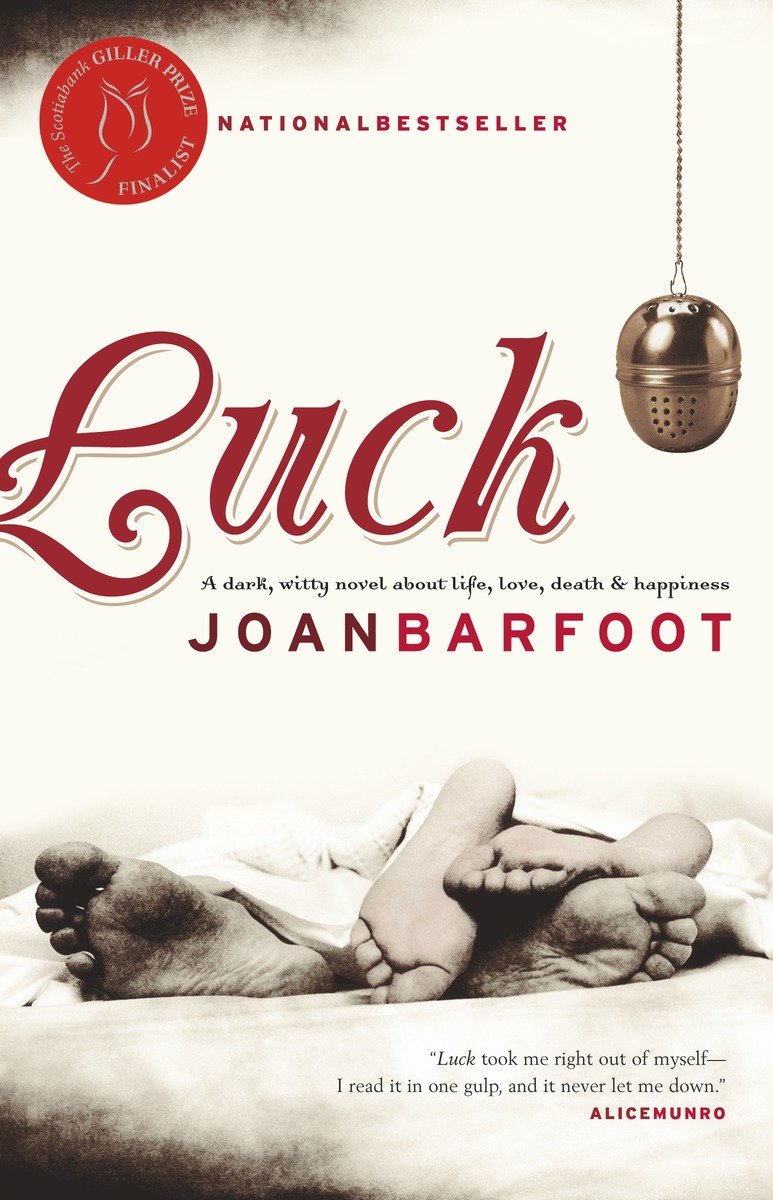Description
“There is good luck, and there is bad luck, and then there’s the ambiguous sort of luck that’s a lot of this and some of the other.”Philip Lawrence, a robust and pleasure-loving furniture-maker, dies suddenly at the age of forty-six. Though that’s terribly young by most standards, he’s lucky to have passed presumably peacefully in his sleep. Less fortunate, however, are the three women he leaves behind to make sense of his loss.There’s Nora, his wife of seventeen years, who wakes up next to his dead body. A fiery visual artist, Nora’s feminist re-interpretation of biblical themes stoked fundamentalist outrage from her small-town neighbours. Now, as her emotions run the gamut, she must confront solo life in a place she despises.Nora shares the house with Sophie, a buxom and bossy redhead, who works as the couple’s housekeeper and personal assistant. A recovering virtue addict, Sophie turns to menial tasks as a way to suppress painful memories of her two-year stint as an overseas aid worker. Philip’s death leaves her quietly reeling.And then there’s the pliable and vacuous Beth, a former beauty queen, who serves as Nora’s live-in muse and model. She mourns not Philip so much as the loss of a haven from her own creepy past.The novel follows the three days immediately after Philip’s death. Privately, each woman deals with memories and emotions, secrets and uncomfortable revelations, while at the same time preparing for the public rituals of mourning (including a funeral like no other). The narrative moves seamlessly from one perspective to another with delicious dark humour and wry insight into the nature of death, love, mourning, fundamentalism and luck.Barfoot’s tenth novel, Luck was shortlisted for the 2005 Scotiabank Giller Prize. The jury citation reads as follows: “Joan Barfoot is at the peak of her powers with this splendidly realized tragicomedy about a household in the wake of an unexpected death. With its note-perfect narration, mordant wit and wonderfully neurotic cast of characters, Luck shows how death can reveal life in all its absurdity and complexity. This scintillating comedy of manners is also a profound meditation on fate, love, and artifice.”
Additional information
| Weight | 0.29964 kg |
|---|---|
| Dimensions | 2.54 × 12.954 × 20.066 cm |
| Author(s) | |
| Format Old` | |
| Language | |
| Pages | 320 |
| Publisher | |
| Year Published | 2006-6-27 |
| Imprint | |
| Publication City/Country | Canada |
| ISBN 10 | 0676977014 |
| About The Author | Joan Barfoot is the award-winning author of eleven novels, including Abra, winner of the Books in Canada Prize for First Novel; Critical Injuries, longlisted for the Man Booker Prize and shortlisted for the Trillium Award; and Luck, shortlisted for the Scotiabank Giller Prize. Her work, which reviewers have variously called ‘harrowing and hilarious’, and ‘gloriously subversive’, has been compared internationally to the fictions of Carol Shields, Anne Tyler, Margaret Atwood and Margaret Drabble. Her other books include Dancing in the Dark, which was adapted into an award-winning Canadian entry in the Cannes, Toronto, and New York Film Festivals; Duet for Three; Family News; Plain Jane, Charlotte and Claudia Keeping in Touch; Some Things About Flying; Getting Over Edgar; and Exit Lines. A recipient of the Marian Engel Award, she has also been a journalist during much of her career. She lives in London, Ontario, Canada. |
| Excerpt From Book | The First DayOneThere is good luck, and there is bad luck, and then there’s the ambiguous sort of luck that’s a lot of this and some of the other. For instance:When Philip Lawrence, already recipient of a reasonably gratifying life, has the misfortune to die, he is just forty-six, which in some other part of the world or some other century would be a grand old age, but is terribly young in this place and time. On the other hand it is his good luck to die quietly in his bed, apparently in his sleep, a remarkably mild and merciful, even enviable, ending. So when Philip Lawrence drifts in the embrace of good luck and bad out of life in the course of an August night, while the air conditioning wafts its comfort indoors, while outside, grass shrivels, flowers wilt, trees droop, animals pant for moisture and air, when the moon is bright but the curtains are drawn and the big old house is mainly silent except for the sounds big old houses make to themselves in the night, there is no particular need to feel sorry for him. Surely if he has suffered at all, it can have been only briefly.A different matter entirely for the living.Not at all enviable or awash in good fortune is whoever wakens beside him and stretches, running the planned events of the day muzzily through the mind, reorienting slowly to the deliciously ordinary or the warmly anticipated, and finds herself on the pillow next to, on the same mattress as, the inert, the cooling, the truly departed. An unambiguously nasty moment for that person, turning to speak, turning to touch. This is no way for a day to begin; nor, really, for anything else to begin, but like it or not there is death lurking, life’s great big vanishing question mark. Might as well see what’s to be made of it. Buck up and face it since, one way and another, everyone must.Today death is rolling into the lives of Nora, Sophie and Beth, and it won’t be long before the entertaining question will arise: which of the three draws the cosmic short straw, who wakens amiably beside Philip Lawrence and is hurtled, unprepared, into horror and shock? What does she do? How does she tell the others – oh, many questions to spark the tongues of the villagers; those villagers, Nora has lately come to feel, who might in another country, another century, have gathered up torches to carry to the house on the hill, intending to punish, and with any luck burn.But Nora’s imagination is in morbid overdrive anyway, since she is, in fact, the one who draws the short straw. It’s Nora who feels consciousness creeping back an hour or so after the dawn. Who is cooled by air conditioning, not by death. Who rolls onto her back and stretches her legs and curls her plump arms over her head, feeling the exhilarating blood warming her arteries and her veins. Who begins ticking off in her mind the anticipated events of the day ahead, and who finally turns to Philip, her husband (and wouldn’t the villagers be disappointed to know it’s Nora respectably beside him at this unrespectable moment?), and sees him smiling a strange, drawn, pale smile.A rictus, as it turns out. Nora does not understand this right away. Most people don’t absorb new information quite that swiftly. She thinks he is having a dream. Even a pleasant dream, considering the strange smile.There’s much to be done, though, no time to waste waiting for dreams, however pleasant, to run their generally unmemorable course; and so she says, softly but cheerfully, intending to give an optimistic bounce to the start of the day, “Philip, wake up, time to get going.” Their plans are to drive to the city a couple of hours away and meet up with Max for lunch and a discussion of a show of her work within the next year or so. Max, who owns a gallery and has represented her for almost two decades, only a few days longer than she’s known Philip, wants to set tentative dates. He has also mentioned he would like to see fresh directions, as she would herself, but these things take time to begin revealing themselves, and then to sink in. So: lunch at a fine and far-away restaurant with Philip and Max, an intense but also languorous conversation with two good men on various interesting subjects – what could be a happier prospect?Not to mention that this could be one of those exciting days in which new directions come clearer.As it will be.“Come on, let’s go, we’ve got lovely big plans.” Philip, an exuberant man, tends to respond to exuberance, if also, less openly and appealingly, to certain kinds of mute need. Whatever his preferences, Nora can only use the devices and charms she has. It is too late to figure out new ones.Later than she could have imagined. Philip is not merely resisting her, content in his dream. She realizes this as her hand grips his arm, intending to shake him, although gently, beginning the day as it should be begun if it is to continue as it ought to continue. His arm is curiously unmalleable. It will not be easily shaken. It implies an absence that has not been implied before.Nora screams. She leaps up.She immediately regrets, not the leaping – who would not leap? – but the scream. It calls attention, it calls the others, she has lost the moment that was just hers. Drawn by the highly unusual sound of Nora screaming, Beth dashes into the bedroom doorway from one direction, her thin cotton nightie awry, and from the other direction comes Sophie still in the process of struggling into her robe, one arm caught and the material flying. Sophie sleeps naked, which it would please the villagers to know, but which does not please Nora, already thoroughly distressed and in no mood for a vision of Sophie’s large, bounding breasts, her fleshy hips, that clutch of invasive red pubic hair, particularly tasteless and bold in the circumstance.Also, what if Philip weren’t dead, what sort of state would this be to arrive in?“What? What?” Beth has the slight voice of a girl, insufficient to many occasions, absurd and offensive in this one. Sophie’s tone, her “What is it, what’s wrong?” is also inappropriate. Too hearty, too ready to take action: to defend or to diagnose and then repair.No defence possible. No repairs to be done. Diagnosis too late.“He’s dead,” Nora says, her own voice, not quite under control, still surprised.Well, what a mixture of voices then, a choral chaos – what is to be done? Make coffee, make tea, close the bedroom door, not in that order. Shut out the sight of Philip, dead and smiling his dreaming rictus smile, shut out his easy overnight departure, shut out the tightening of his limbs, shut out the chill.Call his doctor. Call an ambulance. Why? Never mind, it’s what’s done. No one thinks to get dressed, except for Sophie pulling her peacock-bright robe properly around her large bounding breasts, her fleshy hips, her invasive red pubic hair; and so Beth is still in her cotton nightie, Nora still in her white panties and Philip’s blue pyjama top, all three of them in disarray when the ambulance screams up, its mechanical wail a reproach, making Nora’s already-lost scream insufficiently shocked, inadequately shocking, for the occasion.Philip’s doctor, Ted Marlowe, pulls up in his Jetta. Here comes a police car as well, although without sirens or lights.A man and a woman in matching dark blue rush from the ambulance up the bricked walkway, and up the four steps, and across the hardwood-floored porch to the massive front door, already opened by Nora. Between them they are wielding a stretcher of black rubber, black plastic and something like chrome. “Up there,” and Nora gestures to the staircase. “Second door on the right.” Her thighs, revealed to the daylight, are not what they once were. Neither are Sophie’s, or even Beth’s, but theirs are concealed. |
Only logged in customers who have purchased this product may leave a review.






Reviews
There are no reviews yet.